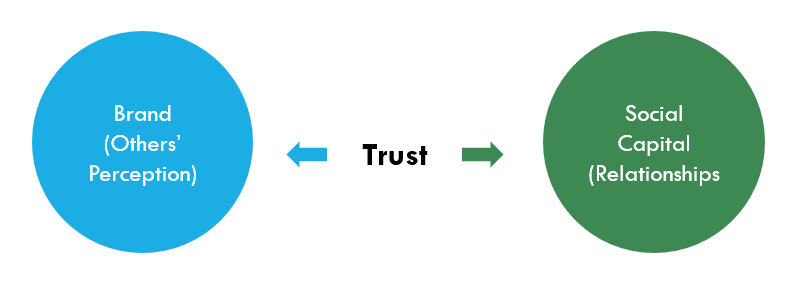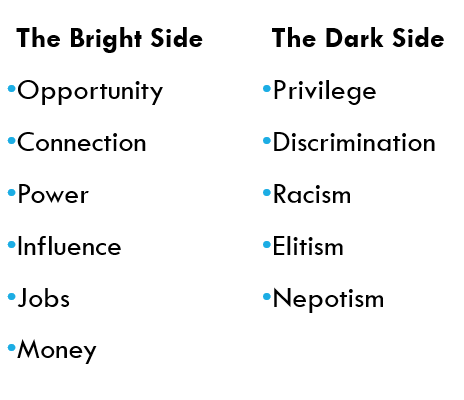#3 Career Foundations Series (Go Back to 2)
Do you know which university has created the most billionaires?
If you guessed Harvard, you’d be right. Harvard has created more than twice as many billionaires as Stanford, which ranks next on the list.
Now I’d bet that Harvard is a great educational institution. But do its grads really fare so much better because they’re taught better stuff?
I doubt it.
So what is it about graduating from Harvard that creates so many billionaires?
Well, I’d wager that Harvard creates so many billionaires because… it’s Harvard.
This might mean that it gets the best and the brightest. But it’s also an old school that still attracts a lot of people with moderate to high amounts of wealth, and propels them into powerful alumni networks that run finance, business, and more.
Harvard grads get something more than just knowledge…. they get powerful brand recognition and an alumni network par excellence that a different school might simply not give you.
In a previous post, I talked about the four pillars of hireability.
- Your Brand: How people perceive you as a professional–whether they read your resume, check your LinkedIn profile, or hear you speak.
- Your Social Capital: Your network and the relationships you have that will launch your career.
- Your Competencies: The things you’re good at, like managing people, resolving conflict, overseeing a project, or curing a disease.
- Your Skills: The specific skills you have (usually hard skills), like coding, web design, photography, or welding. (Often your competencies involve using your skills.)
In this post, I’m going to talk about social capital. If you happened to read some Pierre Bourdieu in school, you might remember that your social capital is essentially the value of social relationships. Investopedia defines it like this:
“The term social capital refers to a positive product of human interaction. The positive outcome may be tangible or intangible and may include useful information, innovative ideas, and future opportunities.”
Investopedia
Having social capital is vital to building the career you want. And its value can be boiled down to one word: Trust.
The unstated secret of career building is that you need people to trust you. Trust leads to success. It turns into jobs and opportunities.
The old axiom is, people do business with those they know, like, and trust.
And it’s the truth.
Trust turns into money. If you ask a stranger on the street to borrow $100 to start a business, what are they going to say? If you ask your best friend, what would they say? Hopefully, “Yes!”
It’s the same with an employer if you’re trying to get a job. An employer is scared of you, believe it or not. And that’s why, often, employers will hire people they already know—even if it’s their useless nephew, Geoffrey.
There are two essential factors in winning and keeping trust: your Social Capital and your Brand.

What is networking? It’s building social capital.
My first job was at a think tank. My windowless office was across from the CEO’s corner one. And the CEO’s job, I realized, was basically to eat and talk. He would have coffee, lunch, and drinks with people from dawn until dusk. He’d schedule a call for the taxi ride from our office to the airport, and another one while he walked through the terminal.
Really? A CEO’s job is to talk to people all day?
As it turns out, in this case, yes. Because the people on the other end of those calls would fund our projects, to the tune of millions of dollars. His relationships created organizational trust. This trust created opportunities and wealth.
The think tank taught me an important lesson. Everything flows from social capital: power, influence, and money…
The secret for job seekers, and the thing most people don’t do, is the same secret that CEO knew. The more time you spend networking with key people, the more that people will trust you. The more people who trust you, the more social capital you have. And the more social capital you have, the more opportunities you have.
Networking is one of the best ways to build social capital, especially for those of us who didn’t have the luxury of being born into an elite family.
The depth and quality of your network will dictate the opportunities you have. And this means that it’s not simply important to know a lot of people. It’s important to know the right people. Those who have access to opportunities and money to spend.
This is why networking isn’t just collecting names or LinkedIn contacts. It’s building valuable relationships with people who will launch your career forward.
Depending on your career goals, these relationships might be with very different people:
- A Hiring Manager at Google
- The Project Manager in charge of hiring consultants
- The CEO
- The Purchasing Officer
- A Venture Capitalist who invests in startups
Or my personal favorite, the employee with no important position who is going to drop your name when the boss asks if they know anyone.
You need different relationships at different points in your career. But the relationships you’re building should, in some small way, be with people who can help you achieve your visions (and hopefully vice versa).
How Social Capital Works
Social capital turns into real capital: money, opportunities, and the ability to do whatever you want in this world. You need to build it.
Of course, social capital has a dark side. It’s why the rich get richer. It’s why privilege helps some get ahead faster by virtue of unearned social capital like gender, racialization, skin color, or ability.

So why am I still talking about it?
Because it’s a reality. Because the world works like this, and me not liking it isn’t going to change the recipe for success.
And finally–and I hope this makes you feel better if you’re worried–because you can grow your social capital, no matter where you are starting. Anyone can access the good side of social capital.
You don’t need rich parents. It doesn’t matter if you went to Hahvahd.
You really can grow it and increase the opportunities you have.
And that’s what I want to teach you.
How to Network to Build Social Capital
Here are activities that grow your social capital:
- Having Coffee with strangers
- Interacting with People on LinkedIn
- Going to Alumni Events and Meeting People
- Taking Stock of Who You Know in Industries and Keeping in Touch Regularly
- Building a Relationship with a Trusted Recruiter
You can also grow social capital through situations that, by default, put you in the spot to build relationships with people.
- Mentorship Programs
- Internships
- Work Integrated Learning
- Sports and Other Activities
- Attending Community Events
The key feature in each of these activities is that they force you to build relationships. Because at the heart of social capital, is relationships. Remember, relationships take trust.
So if you want to build an amazing network that is brimming over with social capital potential, let me tell you where to start.
- I don’t want you to get business cards printed
- I don’t want you to buy new clothes, polish your shoes, or practice your handshake.
This assignment is simple, but if you do it, it will change your future.
Let me repeat this. Future you will thank you profusely for being brave enough to do this.
Go and talk to 10 people.
That is your first step. Don’t make a resume yet. Don’t bring a resume to these conversations, and definitely don’t email it to people. You don’t need a resume for this part.
I want you to build your network through 10 informational interviews. Basically, this means asking people about what they do in a casual interview format and learning about a new field.
I created a post about how to do informational interviews.
This is a time of exploration but let me tell you one more thing. Without realizing it, you will be building social capital.
Some of those relationships may stay with you and open doors. Some of them will be duds and might lead to nothing (hence why you need more than one conversation).
But do this enough, make it a practice, and you’ll see your social capital grow.
Where do you find these 10 people:
Start with the people you know.
You probably don’t have a powerful network yet, but that doesn’t mean that you don’t know some interesting people that you can start with.
You have family members that work in industries that are interesting to you, even if they are not completely the job that you aren’t? Friends?
How about professors, who might be connected in interesting places? You’d be surprised to find that a lot of professors are very well connected outside of the university. Look through all of the classes you’ve taken and see if you can find a professor who might be able to tell you about an industry.
If you are still in school, reach out to the career center to see if they can put you in touch with any alumni in interesting fields. Sometimes they can make these types of connections.
Use LinkedIn
LinkedIn is an incredibly powerful networking platform, and if you have never gotten on there this might be the time to do it.
You can find guides for LinkedIn on the Roostervane here
You will need to take a little bit of time to create your profile first, if you follow my instructions it should take about an hour.
Then, you can use these tips to build your network.
You can use other social media too, of course! I’ve built my network with Twitter. I just happen to think LinkedIn is best for this!
Reach out with something like this…
Hi Amanda,
My name is Jen, I’m just finishing my masters in psychology at the University of Chicago and I’m doing some career exploration. The work you’re doing with homeless youth at Lightdoors is amazing, I can’t believe the impact it’s had on providing direction for these kids. I’m wondering if you’d have time to have time for an informational interview. I’d really value your perspective on a career in a social non-profit as I plan my next steps.
I know you’re busy, and I thank you in advance for any time you can give me.
Jen.
Conclusion
If you’ve done this networking work, you’re well on your way to building social capital. Expect that this will mean more opportunities, especially when combined with your personal brand–which I’ll talk about next time. Good luck!
Can’t Wait to Start?
More Articles on Building Your Network
10 Powerful LinkedIn Tips to Take Your Networking Game to the Next Level
Is Networking Important? In short, Yes! Here’s Why It Will Dramatically Change Your Career



